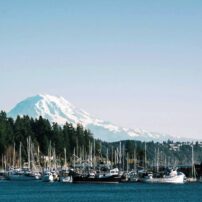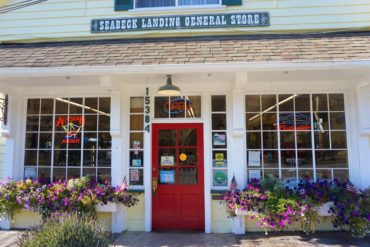
It’s the kind of business where the same regulars hold court each morning over coffee — a place where you can drop by to pick up a carton of milk and check out the community bulletin board, and find a water bowl pit stop for neighborhood dogs.
The area’s small, historical general stores were built to anchor their communities. It was the logical location for the settlement’s new post office, allowing the mercantile’s owner or spouse, who typically lived on the premises, to serve a dual role as postmaster. The merge made the store the hub for far-flung neighbors to catch up on news while buying flour (6 cents a pound), potatoes (2 cents a pound), bolts of muslin, boots and buttons.
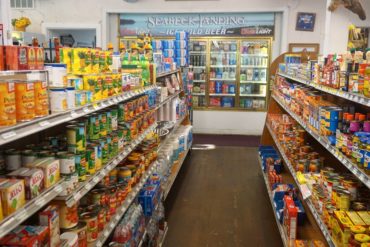
Most of the general stores have disappeared — their buildings lost to fire or time — but many of the local communities have managed to save their beloved mercantiles.
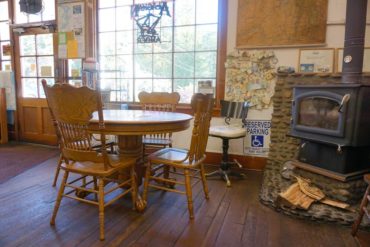
They’ve changed hands multiple times and gone through name changes. Their historic structure has undergone cosmetic updates and been physically relocated. The post office moved elsewhere, its square footage converted to more gathering space or retail sales. But the store as a community anchor has continued to thrive, selling grocery staples while adapting to remain a relevant hangout where locals still catch up on the community grapevine and tourists can savor a slice of history.
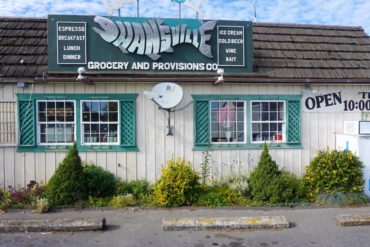
Hansville
The current Hansville Grocery/Hansgrill building was built in 1930, but it was its 1914 predecessor, built by two Norwegian brothers, that established the mercantile as the neighborhood core. When the post office moved into the 1914 store, “men would come to pick up their mail and sit for a spell,” recounts “People of North Kitsap Peninsula,” the Hansville Historical Society community memoir.
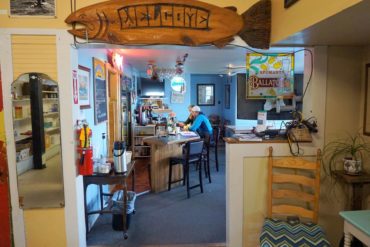
The tradition has continued. At 7:30 a.m., the men of the Koffee Klatch Group meet at their regular table in the store’s café, the site of the old post office. The group’s history is memorialized in a photo display and their meetings have a reputation as an incubator for community improvements. A women’s group called the Solitarians shows up on Fridays for their own café meetup.
Hansville’s store has always served food, in the early days dishing out ice cream, coffee and ham-and-egg breakfasts for the fishermen who trawled off Point No Point and the passengers from the Mosquito Fleet of steamers serving most of the area’s waterfront communities. Today the café offers a grill menu as well as convivial conversation or a quiet place to work, while the storefront carries a supply of staple groceries, fishing gear and tourist items.
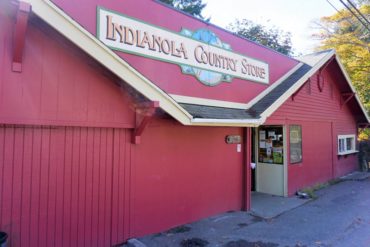
Indianola
At one time, three general stores competed for Indianola’s business, all located at the intersection of Indianola Road and Shoreline Drive near the dock where Seattleites disembarked to summer in Indianola. Two stores were lost to fire and demolition, but the remaining Indianola Country Store & Deli has survived 86 years as a community institution.
In the 1930s, Carl and Mabel Tarbox converted a house built the decade before into a grocery store and living quarters. Wanting to distinguish themselves from their competition, they sold fresh produce and added a soda fountain, booths and a jukebox.
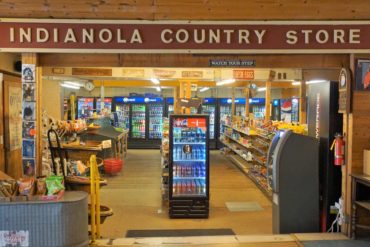
Seven sets of owners have run the store since the Tarbox family. The jukebox, soda fountain and booths are gone, but the store still draws in locals and tourists with its café, warmed by an electric fireplace and full case of deli offerings.
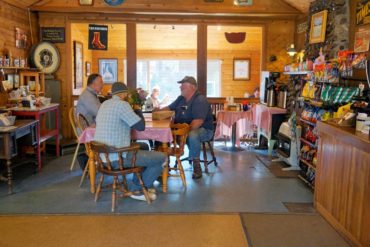
Like Hansville, Indianola is a community of year-around residents that also draws a summer tourist crowd. Rob Trueb, who’s owned the store for 26 years, strikes a balance between regular customers who drop by for last-minute staples like eggs and fresh produce and tourists who forgot their sunscreen. The store’s former living quarters were converted to a full-service grill and espresso stand, and cozy tables play host to two regular coffee gatherings informally known as the early morning and mid-morning groups.
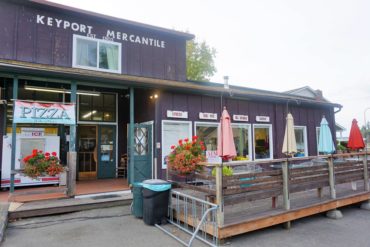
Keyport
The Keyport Mercantile and Diner has been around for 125 years. Built in 1903, it was originally located on property now inside the Navy base. In 1914, the building and business was physically moved to its current location and a dock was built to accommodate steamer passengers and goods needed to supply the store. When the community was in danger of losing its beloved market in 2006, five couples bought and renovated the building and still actively run the business.
Today, in addition to shelves stocked with grocery staples for residents, boaters and Navy base personnel, the waterfront side of the store is a cheerful café serving made-to-order sandwiches, pizza, salads and breakfasts. Weekly, the local mahjong players and a coffee group meet at the café tables and the community’s park committee holds its monthly meeting there.
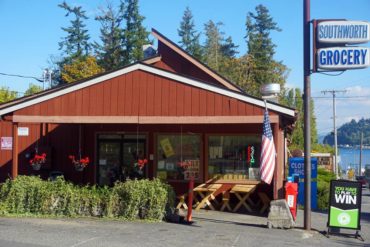
Fondly called “The Merc” by locals, the store has an expansive front deck outfitted with colorful umbrellas and seating in warmer weather. During the community’s 4th of July Parade and September Keyport Fest, it provides a perch to watch the festivities.
Seabeck
The cheerful, yellow Seabeck General Store had its beginnings as a company store selling goods to millworkers at Seabeck Mill. When an 1886 fire destroyed the mill, the company operation soon folded. The fire, however, didn’t destroy the store and it was reopened as a general store for remaining residents and tourists.
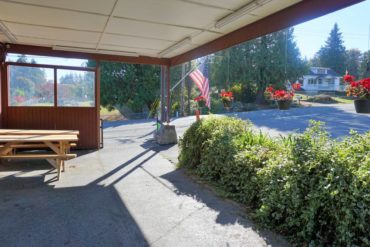
The current building was built in 1933. Located on scenic Seabeck Road, it’s a convenient pit stop for residents who swing by for last-minute groceries from its well-stocked shelves and the marina’s boaters who purchase fishing supplies and local delicacies like nuts, beer and wine. The store’s former post office annex has been converted into a small but carefully curated wine section. The men’s morning coffee group has a key to let themselves in and start a pot brewing before congregating around the store’s homey tables and fireplace while waiting for the owner or manager (who reside upstairs) to open shop.
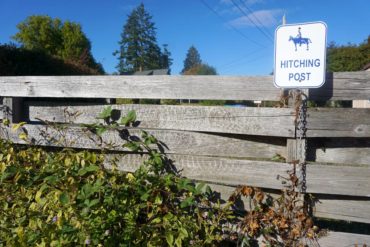
Southworth
Housed in a 1932 red brick building, Southworth Grocery is the only remaining country store with an operating post office annex and the only one still serving passengers commuting by ferry from the nearby dock. Two generations of the Grant family owned and ran the store for years, their tenure ending in 2018 with the passing of Fred Grant.
The store operations have been taken over by Jay Freeland, a relative, who has plans to improve the business while retaining its vintage feel.
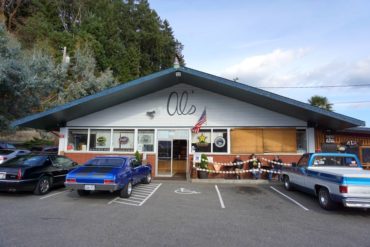
The store’s old gas pumps have been removed and their foundations planted with a proliferation of plants. The front porch area has picnic tables for ferry commuters and the regular morning coffee group who often meet there after picking up their mail. Along with parking spaces, the business offers a hitching post used by neighbors who commute by horse to pick up their mail or grocery staples.
Olalla
Al’s Market is perched on waterfront pilings over Colvos Passage. It’s been a grocery and butcher shop fixture in the Olalla community since the early 1900s.
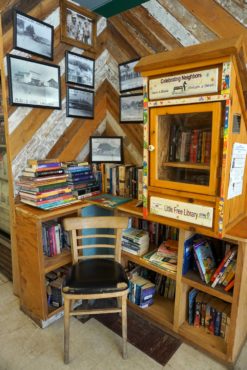
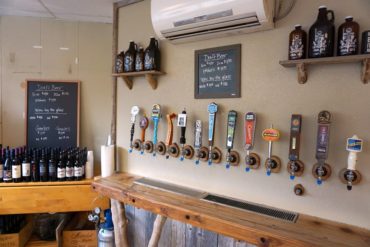
The store’s history is on display in a cozy corner of old black-and-white photos above its Little Free Library of donated books. After the nearly 50-year ownership of the Robbecke family, Al’s underwent a series of changes in ownership and management and along with those changes, new ideas to keep the store as the core of its community.
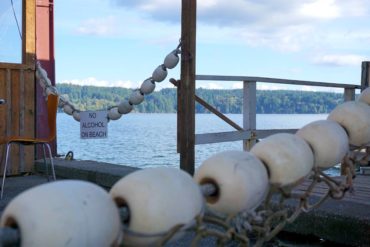
Former owners Mike Homan and Darrell Yates updated the interior, enclosed the outdoor patio to become a beer garden selling craft tap beers and added a café menu to supplement their retail grocery sales. The former next-door post office now houses the store’s kayak rental operation.
Store manager Beth Taylor, who lives in the store’s apartment, is determined to continue trying out new ideas to keep the business profitable. The store now serves breakfast, opening at 7 a.m. to catch commuters and locals who want to meet in the morning. It hosts music nights, often featuring a band called Northwest Chill, all customers of the store. Seahawk games attract local fans to watch the big screen monitor.









